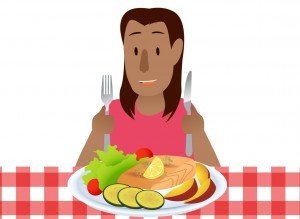Brain-Healthy Foods
 For the most part, the foods you eat to help your heart also nourish your noggin. People with heart disease are more likely to have cognitive impairments and dementia. That’s not surprising since both the heart and the brain require healthy blood vessels free of atherosclerosis.Nourish your noggin with fruits and vegetables. Unfortunately, these are some of the most under-consumed foods. But fortunately, they’re easy to fit in the diet. Fruits and vegetables provide a bevy of nutrients, including dietary fiber, potassium, magnesium, folate, and vitamins A, C, and K as well as a variety of health-boosting phytochemicals.
For the most part, the foods you eat to help your heart also nourish your noggin. People with heart disease are more likely to have cognitive impairments and dementia. That’s not surprising since both the heart and the brain require healthy blood vessels free of atherosclerosis.Nourish your noggin with fruits and vegetables. Unfortunately, these are some of the most under-consumed foods. But fortunately, they’re easy to fit in the diet. Fruits and vegetables provide a bevy of nutrients, including dietary fiber, potassium, magnesium, folate, and vitamins A, C, and K as well as a variety of health-boosting phytochemicals.
- Lutein, a phytochemical relative of beta-carotene, may boost cognitive performance in older adults. Lutein is found in leafy greens, winter squash, corn, peas, pistachios and even egg yolks.
- One study found that a high consumption of apples, pears, and other white fruits and vegetables may protect against stroke.
- Greater intakes of blueberries and strawberries are associated with slower rates of cognitive decline among older women.
Make a commitment to eat fruits and/or vegetables at every meal and snack.Nourish your noggin with fish. Choose fish that are high in omega-3 fatty acids, like salmon, sardines, tuna and trout. Researchers found that individuals with the highest amounts of fish-derived omega-3 fatty acids in their blood were 40% less likely to have an infarct (small area of dead tissue) in their brains compared to those with low amounts of omega-3 fats in their blood. Other research shows that fish-eaters have slower rates of developing dementia or mild cognitive impairment. Enjoy fish that is baked or broiled, not fried or breaded.Nourish your noggin with unsaturated fats. Cook with oils instead of butter and margarine. Enjoy seeds and nuts, nut butters, olives, and avocados. Diets high in saturated fats – think animal fats and coconut - appear to harm cognitive function and memory, whereas eating foods rich in unsaturated fats might help.Nourish your noggin with herbs and spices. Sprinkle more herbs and spices and less salt. Sodium tends to increase blood pressure, which is harmful to both the heart and the brain. Herbs and spices have the same types of nutrients and phytochemicals that are present in fruits and vegetables.Your total diet and lifestyle matter. Don’t forget to make time for sleep, exercise and stress management.By Jill Weisenberger, MS, RDN, CDE, FAND


